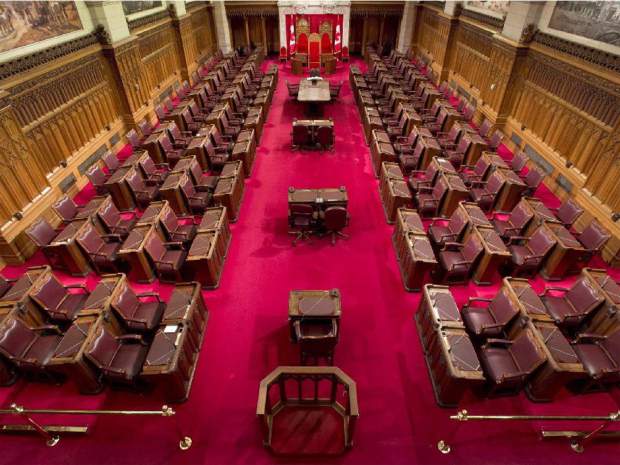Independent senators — and the faux-independent Leader of the Government in the Senate, Senator Peter Harder — have been sending out numerous press releases and tweets for the past several days about a poll recently conducted at the behest of Senator Donna Dasko. Its conclusion? That Canadians love the "new" Senate. Now, did Canadians understand the "old" Senate? Nope. So, if they didn't understand the old one, how can they love the new one? Senator Dasko may well have polled Canadians as to whether they liked ponies or unicorns, and she probably would have received similar results.
The questions being asked in this poll, according to the posted methodology, had people giving responses on their general impressions on Canadian senators, and whether they had heard of any changes that have been made to the Senate over the past few years. From there, it asked for positive or negative impressions on changes to the appointment process, including:
- Canadian citizens can now APPLY for Senate positions that come open?
- An independent advisory board reviews and assesses the applications for the Senate that are received?
- New Senators are not active in a political party and sit as independent members in the Senate?
- Taken together, do you think these changes will improve the Senate, make it worse, or will they make no difference?
- And looking ahead, do you think a future government should keep these changes or go back to the previous ways of appointing Senators?
According to the posted results, some 77 percent of respondents want to carry on with the new system of appointments, while three percent wanted the old way of appointment. Some 70 percent liked the open application process, and 83 percent liked the independent advisory board. A further 81 percent liked that new senators don't sit with a political party, contrasting with five percent who don't agree with the move toward independence.
Overall, some 59 percent felt the changes will improve the Senate, three percent felt it will make it worse, and 24 percent felt it would make no difference. Of course, only 37 percent of the respondents actually had a positive impression of the Senate (which was up from 25 percent in a 2016 poll), while 46 percent still hold a negative impression. It's as though decades of stories about how terrible the institution was have left a lasting impression or something.
Why do these results matter? In short, because I fully expect the independent senators will use them as justification to carry on agitating for internal reforms and rule changes that may be seen to benefit them, but may do lasting damage to the institution because the vast majority of them don't actually understand the institution, its history, or even its role within Parliament as a whole. Remember just a few weeks ago that the Independent Senators Group held their retreat and there were a lot of discussion items on their agenda that focused on questions like "What tools can the ISG use to leverage more public attention?" or what procedural changes would be "most compelling" from a public perspective as examples of Senate modernization. In other words, they wanted to sell the public on how they were new and different from the "bad old Senate" without actual regard for the fact that those changes could have material consequences to Parliament. Waving poll results around to try and push for changes to get public approval is a dangerous game.
It's easy to get people to respond to poll questions on less partisanship because we are conditioned to think that partisanship is a bad thing (when other people are engaged in it, mind you — nobody thinks that they're partisan). What it fails to capture — and what nearly all of the new Independent senators fail to grasp — is that there is a place for partisanship in the Senate, and that it's actually a very bad thing to completely divorce senators from the parliamentary caucus rooms. What most people don't realize is that the Senate is the institutional memory of Parliament, and that includes within party caucuses. The fact that they have institutional independence means that it's easier for them to push back against their leaders over poor plans and ill-conceived ideas because they don't have to worry about not getting their nomination papers signed, and they can offer a check on the power of the leader behind the closed caucus room doors. This is why Justin Trudeau's decision to expel all of the Liberal senators not only had the effect of centralizing his power, it left his caucus of mostly newbie MPs hobbled in terms of having experienced voices that they could turn to.
Now, that doesn't mean that there isn't a place for Independent senators. If the chamber were actually functioning at its best, we would see a roughly equal number of Conservatives, Liberals, and Independent cross-benchers that would not only let the Senate retain its institutional memory function, but which would also avoid the problems that came with the duopoly of power. Not that these new Independent senators see this — they are fixated on a vision of a Senate that is nothing but independents, because they don't understand how the Chamber functions in practice, let alone in theory.
The other reason why this poll bothers me is because a number of those Independent senators plan to use it as political leverage in the upcoming election. Their press release warned that Andrew Scheer has promised to scrap this new appointment process that apparently everybody loves (and they have polling data to prove it), and Senator Yuen Pau Woo, the "facilitator" of the Independent Senators Group, keeps tweeting that he wants Senate appointments to be an election issue, seemingly oblivious to the fact that this means he is de facto shilling for Justin Trudeau in spite of his vaunted independent status. Whether that's naiveté or a brand of arrogance in which he doesn't realize the message he's sending remains to be seen, but it's not the Senate's job to poll well. Its job is to be sober second thought, which means avoiding the electioneering of the Other Place. Trying to insert senators into the election, good poll numbers or not, is a dangerous game.








